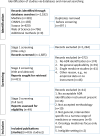Methods for identifying adverse drug reactions in primary care: A systematic review
- PMID: 39903764
- PMCID: PMC11793789
- DOI: 10.1371/journal.pone.0317660
Methods for identifying adverse drug reactions in primary care: A systematic review
Abstract
Background: Identification of real-time adverse drug reactions [ADRs] (as opposed to the risk of ADRs) in older poly-medicated people in primary care is a challenging task, often undertaken without an explicit strategy. This systematic review aims to evaluate replicable instruments and methods for identifying and addressing ADRs.
Methods: A systematic search was conducted in Medline, CINAHL, Scopus, Web of Science and Cochrane library, using controlled vocabulary (MeSH) and free-text terms. Randomised controlled trials (RCTs) implementing strategies to identify or resolve ADRs experienced by patients in primary care were included. Two reviewers independently screened studies, extracted data, and assessed the risk of bias using the Cochrane Risk of Bias tool. Discrepancies were resolved by discussion.
Results: From 2,182 unique records, 49 studies were identified for full review. Eight papers reporting results from 6 RCTs were included. All six trials utilised a list of medicine-related unwanted symptoms to identify ADRs. Two of three studies using adverse drug reaction questionnaires reported statistically significant increased rates of ADR reporting. Two of three studies that combined symptom questionnaires with prescriber consultations reported reductions in the number of health problems. Overall, results suggest that the three studies that described multidisciplinary collaborations using lists of ADRs plus prescriber reviews enhanced patient safety. However, the RCTs were unblinded and reported suboptimal retention. When considered as a whole, findings are equivocal and the data are too heterogenous to warrant any firm conclusions, beyond the need for more research to optimise strategies to safeguard patient wellbeing.
Implications: Adaptable and scalable instruments with decision support are needed in primary care to identify and mitigate medicine-related harm in older poly-medicated people. The effectiveness of adverse drug reaction identification instruments, the value of comprehensive instruments, and the optimum method of delivery should be explored in multicentre trials.
Copyright: © 2025 Logan et al. This is an open access article distributed under the terms of the Creative Commons Attribution License, which permits unrestricted use, distribution, and reproduction in any medium, provided the original author and source are credited.
Conflict of interest statement
The authors have declared that no competing interests exist.
Figures
Similar articles
-
A rapid and systematic review of the clinical effectiveness and cost-effectiveness of topotecan for ovarian cancer.Health Technol Assess. 2001;5(28):1-110. doi: 10.3310/hta5280. Health Technol Assess. 2001. PMID: 11701100
-
Eliciting adverse effects data from participants in clinical trials.Cochrane Database Syst Rev. 2018 Jan 16;1(1):MR000039. doi: 10.1002/14651858.MR000039.pub2. Cochrane Database Syst Rev. 2018. PMID: 29372930 Free PMC article.
-
Drugs for preventing postoperative nausea and vomiting in adults after general anaesthesia: a network meta-analysis.Cochrane Database Syst Rev. 2020 Oct 19;10(10):CD012859. doi: 10.1002/14651858.CD012859.pub2. Cochrane Database Syst Rev. 2020. PMID: 33075160 Free PMC article.
-
Interventions for promoting habitual exercise in people living with and beyond cancer.Cochrane Database Syst Rev. 2018 Sep 19;9(9):CD010192. doi: 10.1002/14651858.CD010192.pub3. Cochrane Database Syst Rev. 2018. PMID: 30229557 Free PMC article.
-
Falls prevention interventions for community-dwelling older adults: systematic review and meta-analysis of benefits, harms, and patient values and preferences.Syst Rev. 2024 Nov 26;13(1):289. doi: 10.1186/s13643-024-02681-3. Syst Rev. 2024. PMID: 39593159 Free PMC article.
References
-
- World Health Organisanisation. Medication without harm. WHO global patient safety challenge; 2017 [cited 2021 Nov 7]. Available from https://apps.who.int/iris/bitstream/handle/10665/255263/WHO-HIS-SDS-2017...
Publication types
MeSH terms
LinkOut - more resources
Full Text Sources
Medical
Research Materials




